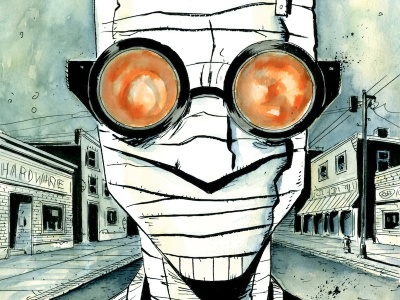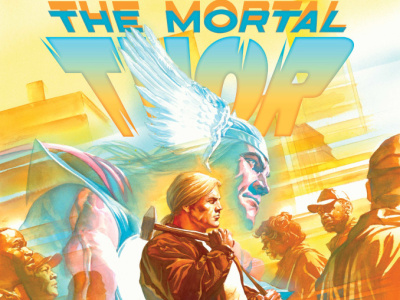We spoke to retailer Brian Hibbs of Comix Experience in San Francisco on Thursday to discuss the completion of a three-and-a-half-year class action court case that he initiated in 2002. The suit, in which Hibbs sued Marvel over Marvel's refusal to accept returns on books that shipped late or with contents not as solicited, will be wrapped up next week as most direct market retailers receive credits based on their damages (see 'Marvel Class Action Pay-Out Next Week'). Hibbs filed the initial suit and was directly responsible for the collection of substantial damages paid by Marvel to the entire class of retailers in the case.
We'll start with the Today Show question: How does this make you feel?
Gosh, I just feel great, Wink (laughs).
I'm really glad that this is finally over. It's been a really, really, really long trip, so to have this finally be put in the done zone is just great.
What was the total amount of credits issued?
I'm not 100% sure. The number I was told (but I don't think it was exact) was $1.5 million in credits, but I'm not sure if that has any real basis other than an estimate.
How much did the attorneys get?
They got $375,000, which was on top of the credits, not from the credits.
Class actions suits are sort of a political football these days. Specifically, there's a lot of criticism in some circles of the mechanism by which the groups are put together and how they work. How do you think 'the system' worked in this case?
I really think that this was a perfect example of a class action lawsuit, where there was a clear and very definable harm that was done to everybody, but the individual harm to each person was not so high that it would be worth litigating. In my case, I think it ended up being $1500 worth of credits that we're getting. You can't even talk to a lawyer for $1500. Doing things in small claims court, things like that, it's not worth anybody's time. But when you add all the retailers together and suddenly it becomes a million and a half dollars, then you have something significant. I'm actually incredibly pleased with the way the legal system ended up working despite all the delays and the silliness of it, and I think this was really an ideal example of what class actions can do.
What's your assessment of Marvel's performance on the issues you sued about (resoliciting books that were late or had the contents changed), now?
For the most part, the Final Order Cutoff system has gotten rid of most of the need to re-solicit. I think that they could do a better job. For example this week we're getting an issue of Kabuki that was due out in June, and it's October now. It would have been nice to have that book re-solicited. But we have had the opportunity to lower our orders all we want. I think that if there's a problem at this point, it's a lack of appropriate communication between what we're seeing on the FOC list and how that relates outside of that individual week's list. As an example, about a month ago, they shipped an issue of Avengers, I think it was #10, and then the following week they shipped Avengers #11. When you're looking at the FOC list it's very difficult to look outside the weeks you're looking at to recognize that because the previous issue was so late they're shipping the next issue only a week apart. That would have lowered my orders dramatically more if I'd actually understood that. Having said that, Marvel does seem like they are still taking some things on returns when it's an egregious situation. There was just something on last month's return list that was a Marvel book that they realized that even with FOC they still needed to make the book returnable. As long as that continues into the future, I don't think we have any particular issues.
What about other publishers? Do you think that over-all, most publishers respect retailers' needs in how they handle this kind of situation?
Respect their needs? I don't know about that. I think publishers could do a lot more work in making sure their trains run on time and do the things that they're supposed to do.
Do you see situations that are as egregious as the situation was with Marvel? Are there publishers out there that are abusing the system and that need to get their ships in order?
I definitely do think that there are. Sometimes it's really widespread. Image still has pretty huge late ship problems, although it sounds like they're making attempts to fix that. Certainly we've seen a number of new publishers over the last year have tried to enter the marketplace, and tried to enter it with their first months books shipping all at once or shipping late.
With Marvel we were lucky that the contract we had was very specific. Unfortunately, with other publishers, things aren't that specific and aren't that laid out and there's not very much that we're able to do about it, legal system or not.
I definitely think there could be more ethical weight being put from publishers on making sure these things don't happen and no-one would even have to consider legal action.
One of the things we see as an outcome of this suit is a liquidity shot in the arm for the comic retailer community. What's your take on the impact on the retailing community as a whole?
My understanding is that pretty much every direct market retailer that's been in business for any length of time is going to get about a free week's worth of Marvel comics, and in some cases a little bit more, like a week and a half. You cannot overstate the value of that money going back into the direct market. Almost every comic shop is a small ma and pa operation that is running very, very close to their cash flow. We just don't have chains, for the most part, in this business. So to have that money put back into the stores is amazing and hopefully stores will use the money appropriately.
What kind of reaction are you getting from other retailers, now that they're seeing that credits are going to come soon. Are you getting any kudos or thanks from people?
Yeah, I've been told that for the next year at least, I don't have to buy any alcohol at any cons or any industry event.
That may use up the amount of the credit.
(Laughs) I don't know if even I can drink a million and a half bucks worth of booze.
Maybe switch to the 24 year old scotch.
Everybody's just been amazingly positive towards this. I'm really happy that this has worked out and getting this money back to people -- the money that they deserve.
What kind of attitude do you detect from Marvel about it?
I haven't detected any attitude on either side of the thing. I tend to suspect, and this is completely a guess and not based on anything, that Marvel in particular has kind of a funny corporate structure, where you've got people who are the 'direct market in the trenches' people like David Gabriel who know very, very well that you should treat your retailers with respect and make sure their books are sellable and on time and so on; and then you've got, I don't know if it's the board of directors or the bean-counters or who, who look at Marvel as a way to make money and only a way to make money and all they care about is making money and frankly if it all disappeared six months from now, as long as they're making money, I don't think they'd particularly care. So that brings a really peculiar dichotomy to a company like Marvel where on a corporate level they bring any number of strategies that appear to me to just be screwing their business in the neck a year from now or two years from now but they don't seem to care about that. I find that very frustrating as a comic retailer because I want to be here a decade from now, or two decades from now, and I still want to be selling Marvel comics at that point. No-one has said anything to me, though, one way or the other.
Any other comments you want to make on the outcome?







